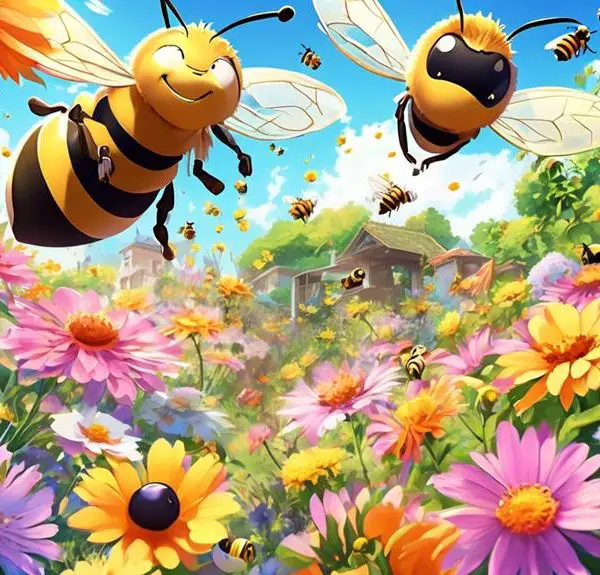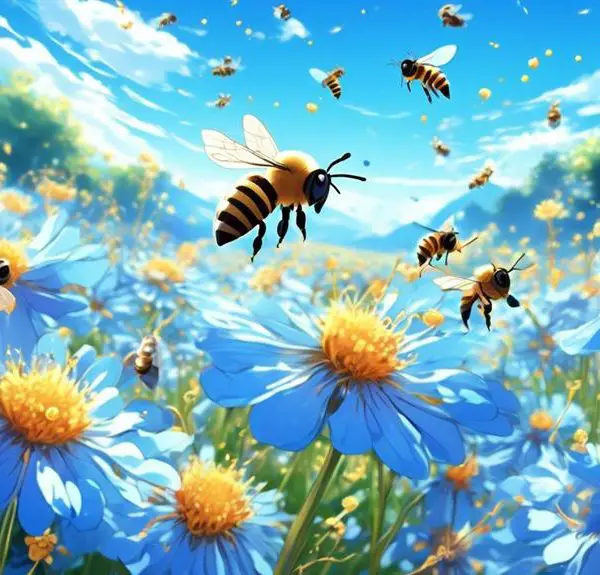Take flight into the intriguing world of bees and discover whether these buzzing insects have an uncanny taste for blood.
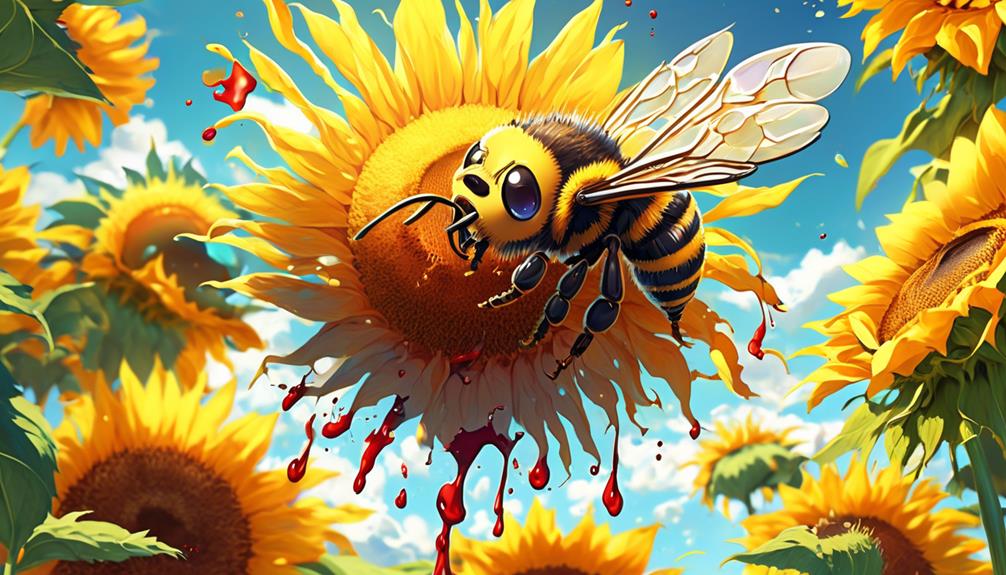
Do Bees Like Blood
Have you ever wondered if bees, those industrious little pollinators we often associate with honey and springtime, have an affinity for blood?
You're not alone. This unusual question stems from observations and stories about bees being attracted to wounds or cuts.
As you delve into this peculiar inquiry, you'll find that it's not a simple 'yes' or 'no'. The answers lie in understanding a bee's dietary preferences, sensory perception, and behavior.
So, ready to debunk some myths and unravel the truth about bees' taste for blood?
Key Takeaways
- Bees are nectarivores and primarily feed on nectar from flowering plants.
- Bees gather pollen, which provides them with protein, vitamins, minerals, and fats.
- Bees do not actively seek out or have any interest in blood as a food source.
- Bees' sensory perception is highly adapted to detect and interact with floral compounds, not the presence of blood.
Understanding Bee's Dietary Preferences
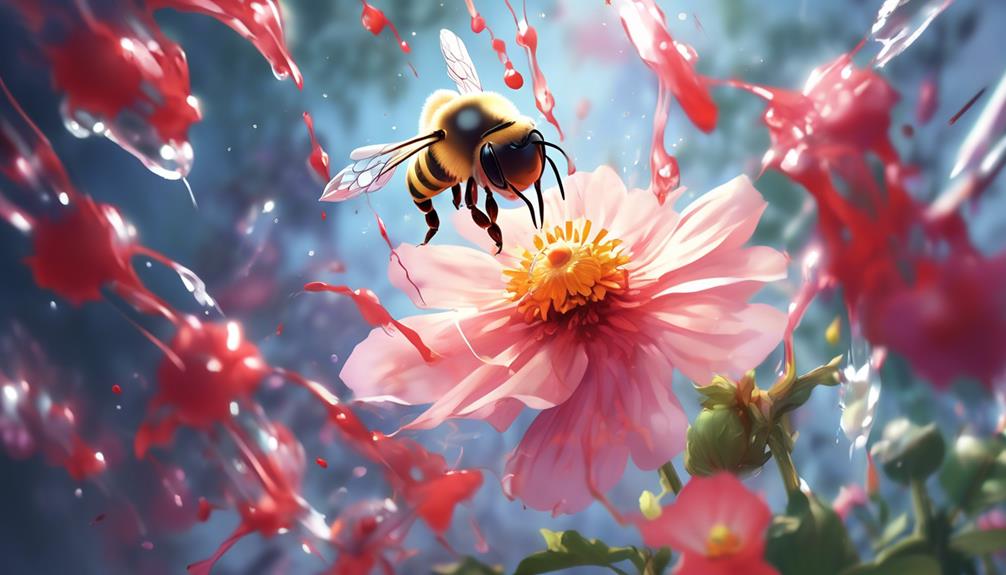
To fully comprehend a bee's dietary preferences, it's essential to delve into their natural feeding habits and understand what nutrients they primarily seek.
Primarily, bees are nectarivores. They feast on nectar, the sweet liquid produced by many flowering plants. This nectar provides bees with their primary source of energy, carbohydrates. They also gather pollen, a potent source of protein, vitamins, minerals, and fats, necessary for the growth and development of their larvae.
However, bees aren't limited to a vegetarian diet. They're opportunistic feeders and can occasionally resort to other food sources when nectar and pollen are scarce. They've been observed feeding on honeydew, a sugary secretion of aphids, and even on the juices of ripe fruits.
You must remember, though, that bees don't actively seek out blood. They might be attracted to the salts and minerals present in sweat, which could explain why they sometimes land on humans. But, given a choice, they'd always opt for their primary dietary components: nectar and pollen.
The Bee's Sensory Perception
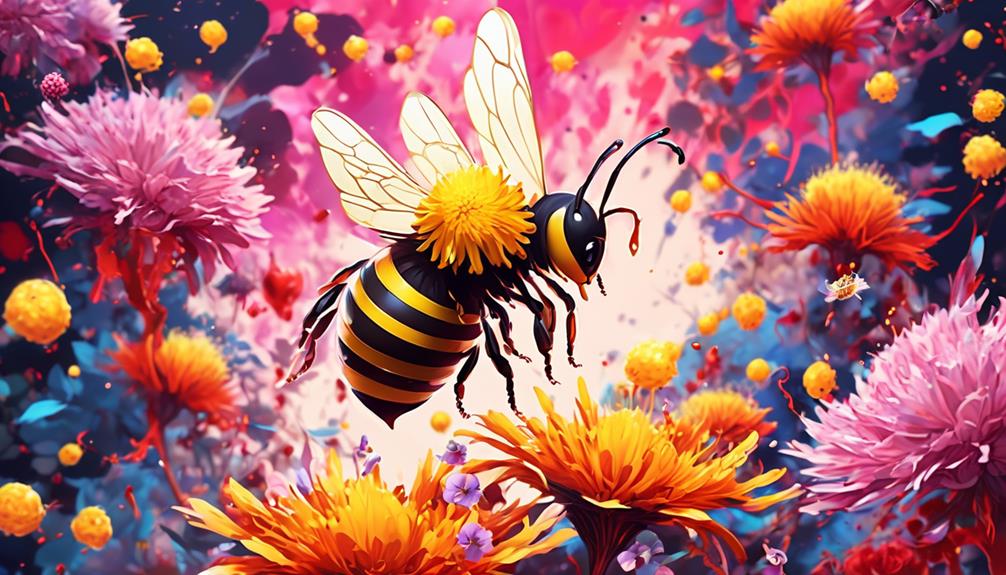
Understanding a bee's sensory perception is key to discovering how they interact with their environment and locate their preferred food sources. Bees utilize a complex array of sensory information, including vision, olfaction, and tactile senses.
Their vision, primarily ultraviolet, enables them to discern patterns and colors in flowers that are invisible to the human eye. This ability, coupled with an innate preference for certain colors and symmetrical patterns, guides them to nectar-rich blossoms. Their intricate compound eyes also detect polarized light, assisting in navigation.
In terms of olfaction, bees possess an exquisite sense of smell. They're equipped with antennae, containing numerous olfactory receptors that detect volatile plant chemicals and pheromones, crucial for communication within the hive and foraging.
Tactile senses play a part too. Their antennae and body hairs detect wind speed, temperature, and touch, aiding in flight and foraging. They can even sense electric fields of flowers, further assisting in nectar detection.
Do Bees Sense Blood?
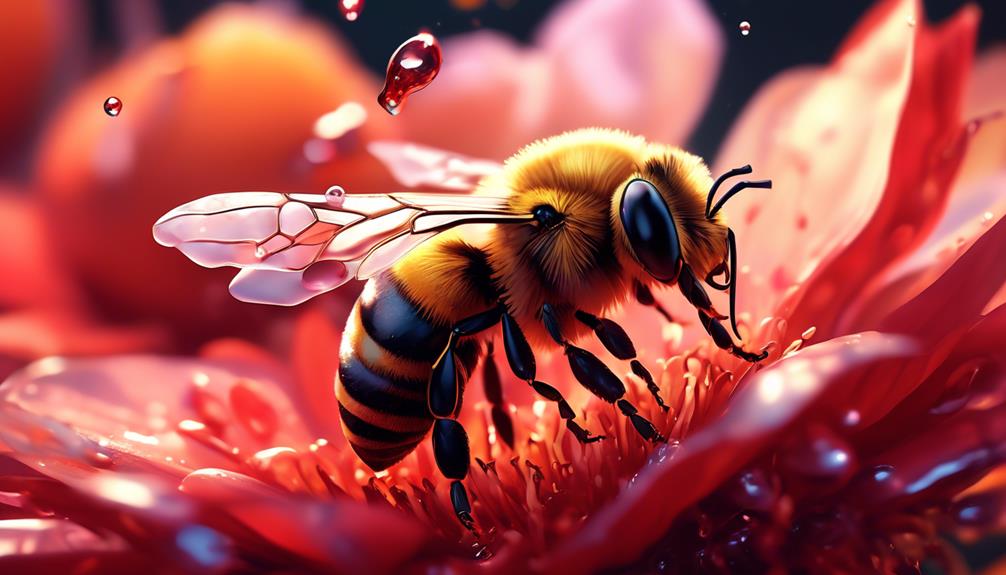
So, can bees actually sense blood? The short answer is 'no'. Bees aren't like mosquitoes or vampire bats that are attracted to blood. Bees have a highly developed sense of smell, they can detect the nectar of a flower from miles away. However, their olfactory system isn't designed to detect complex compounds like those found in blood.
Bees rely on their antennae for sensory input. Each antenna is equipped with thousands of sensory receptors that can detect a wide range of chemical compounds. But blood is a complex substance, made up of various cells, proteins, and other molecules. It's not a scent that bees are biologically equipped to identify.
Moreover, bees are vegetarians. They feed on nectar and pollen, not on blood or flesh. Their mouthparts are designed for sucking up liquid nectar, not for biting or drawing blood. So, even if bees could detect blood, they wouldn't be interested in it.
Blood VS Nectar: A Comparison
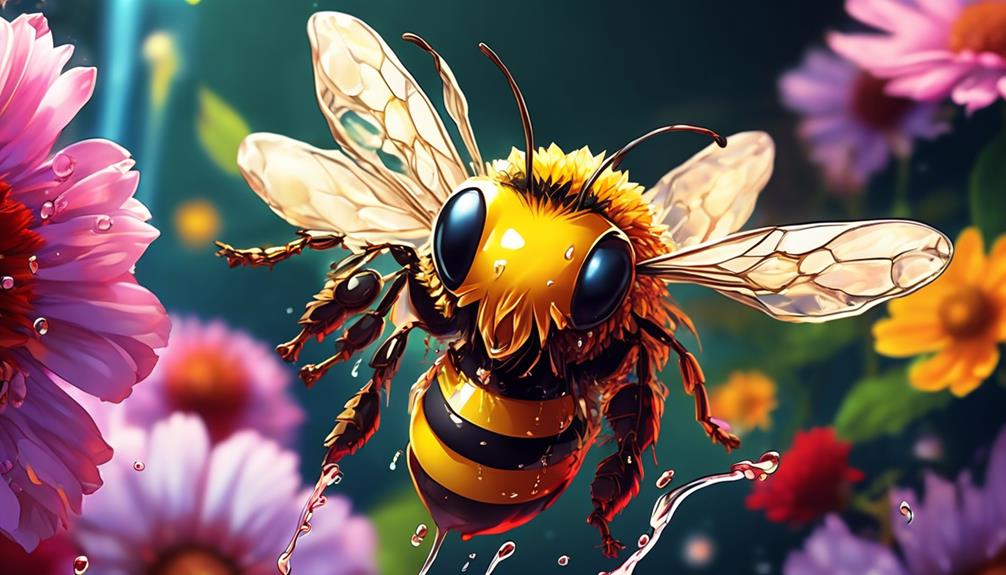
While bees aren't enticed by blood, they are remarkably adept at locating and extracting nectar, their primary source of nutrition. You may wonder why they prefer nectar over blood. The answer lies in the composition and benefits each substance offers.
Let's delve into a side-by-side comparison of blood and nectar:
Substance | Composition |
|---|---|
Blood | Mostly water, proteins, nutrients, and oxygen-carrying red blood cells. |
Nectar | Primarily made of water and sugars, with traces of amino acids, vitamins, and minerals. |
Substance | Benefits to Bees |
Blood | None. Bees can't digest the proteins in blood. |
Nectar | Essential source of energy, helps in honey production. |
The table shows that nectar, rich in sugars, is an excellent energy source for bees. It's crucial for their survival and honey production. Blood, on the other hand, does not provide any benefits to bees. They lack the necessary enzymes to digest blood proteins, making it an unsuitable substance.
Bee's Behavior Around Blood
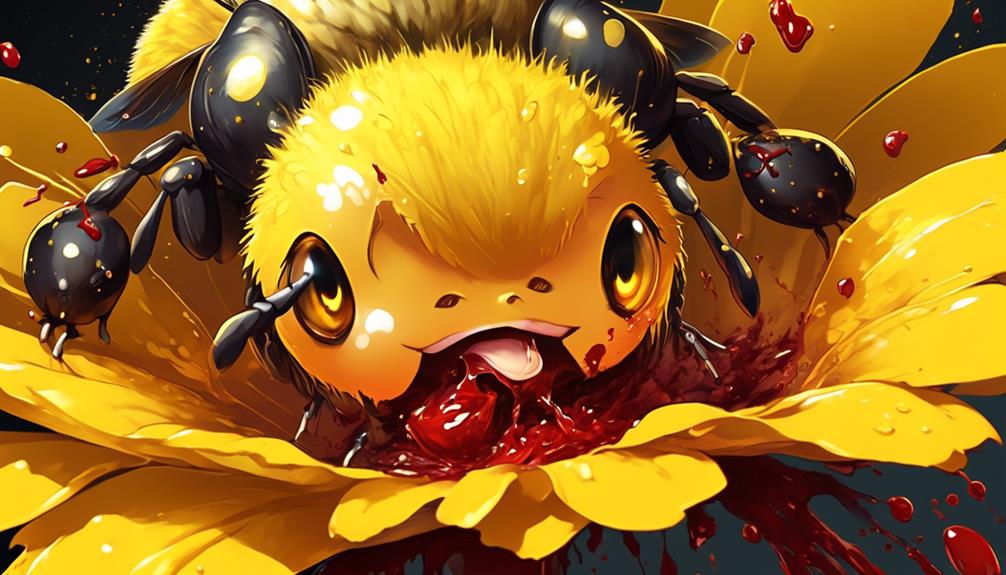
Despite their attraction to bright colors and sweet scents, bees aren't drawn to blood, displaying an indifferent or even aversive behavior when confronted with it. From a biological perspective, bees are nectarivores, meaning they feed primarily on nectar and pollen from flowers. Their sensory apparatus, particularly their proboscis and antennae, are specifically designed to detect and consume these plant-based substances. They don't have the necessary biological tools to extract nutrients from blood.
Furthermore, bees' olfactory senses are highly tuned to detect floral compounds, not the metallic, salty presence of blood. Their antennae contain odorant receptors that identify and respond to the specific chemical compositions of nectar and pollen. Blood, with its distinct iron-heavy composition, doesn't trigger these receptors, making it effectively invisible to bees' sense of smell.
In essence, while bees might investigate a bright red splash of blood due to its color, they'll quickly lose interest when they realize it isn't a potential food source. Their behavior around blood is a reflection of their evolutionary adaptation – a laser focus on plant-based nutrition sources that keep their hives thriving.
Unraveling the Myth: Bees and Blood
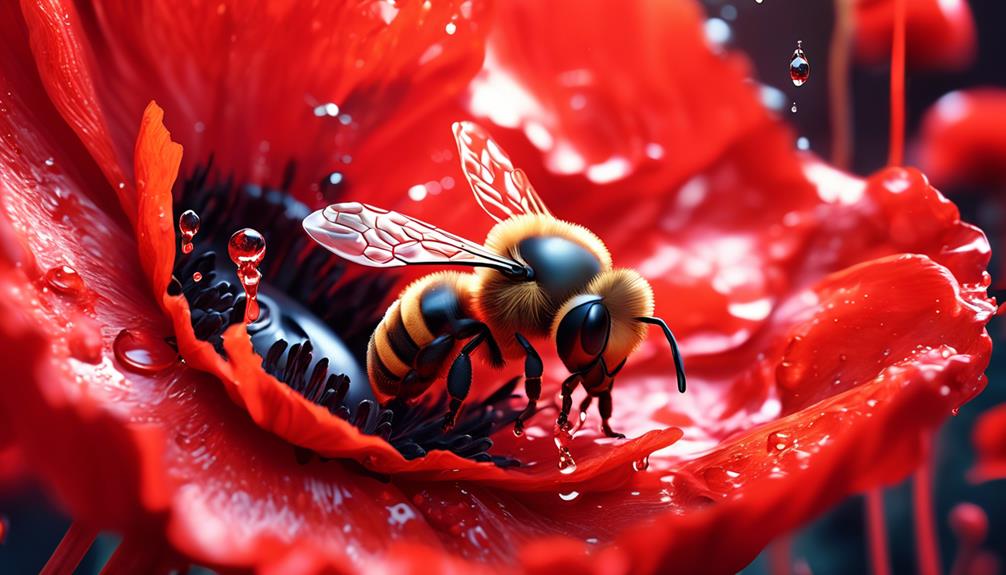
Understanding these scientifically proven facts about bees' behavior can help dispel the enduring myth that bees are attracted to blood. You might be surprised to learn that bees, from honeybees to bumblebees, aren't attracted to the scent or taste of blood. In fact, they're vegetarians, feeding on nectar and pollen from flowers.
They're drawn to bright colors and sweet smells, which often leads them to human gatherings, not the scent of blood. Their stingers, used solely for defense, aren't designed for blood extraction.
Here's a table to get a better understanding:
Bee Type | Diet | Attracted to Blood? |
|---|---|---|
Honeybee | Nectar and Pollen | No |
Bumblebee | Nectar and Pollen | No |
Carpenter Bee | Nectar and Pollen | No |
Frequently Asked Questions
How Do Bees React to the Smell of Other Animals' Blood?"
You might think bees would be attracted to the scent of blood, but they're not. Bees primarily seek out floral scents, as these indicate the presence of nectar, their main food source. They don't have any real interest or reaction to the smell of other animals' blood. It's not part of their food chain, so they're not naturally drawn to it.
Can Bees Get Nutrients From the Blood They Might Encounter?"
No, bees can't extract nutrients from blood. They're vegetarians, and their bodies aren't equipped to digest animal proteins. Instead, they collect nectar and pollen from flowers, which provide sugars and plant proteins.
If a bee encounters blood, it's likely due to its sharp sting piercing skin, not a dietary choice. So, while they may be attracted to the smell, they won't consume blood for nutritional gain.
What Are the Potential Health Risks for Bees if They Ingest Blood?"
You're wondering about the potential health risks for bees ingesting blood.
It's unlikely they'd be attracted to blood as they prefer sweet nectar. If they did, it could introduce pathogens not part of their usual diet, possibly causing disease. Additionally, the iron in blood could be toxic to bees in large quantities.
It's vital to note, though, that this is speculative as there isn't much research on bees consuming blood.
Are Bees Attracted to Certain Blood Types More Than Others?"
No, bees aren't attracted to specific blood types over others. They're attracted to sweet substances, like nectar and pollen in flowers. It's their primary food source and where they get their energy. Plus, their anatomy is designed for this diet.
The idea of bees being attracted to blood, regardless of type, is a misconception. They might land on a person, but it's usually due to attraction to bright colors or sweet scents, not blood.
How Does Blood's Composition Affect a Bee's Interest or Disinterest?"
You might wonder how blood's composition affects a bee's interest. Well, it's not the blood they're after, but the salt and minerals it contains. Bees don't typically seek out blood, but they're attracted to its saltiness when other sources aren't available.
The blood type doesn't matter to them. Remember, bees' primary food sources are nectar and pollen from flowers. Blood's just a backup plan in dire circumstances.
Conclusion
In dissecting the myth, it's clear that bees aren't attracted to blood. Their dietary preferences lean towards nectar, not blood.
Bees' sensory perception can detect blood, but it doesn't allure them. When comparing blood to nectar, the latter wins every time.
So, next time you're outdoors, don't worry about your minor scrapes and cuts attracting a swarm. Bees aren't out for your blood, they're just out for a sweet, nectar-filled meal.

